Tourism Ethics & Governance: A Case Study of Vanuatu's 'Broken Dream'
VerifiedAdded on 2023/06/11
|6
|2438
|336
Case Study
AI Summary
This case study delves into the ethical and governance challenges facing Vanuatu's tourism industry, particularly focusing on the impact of cruise ships and the distribution of economic benefits. It highlights issues such as foreign investment, land rights, corruption, and the lack of stability, which hinder the island's development. The study examines the ethical effects of P&O Cruises and the anti-money laundering efforts of Vanuatu, suggesting that the government needs to enhance financial regulations and cooperation with international agencies. Furthermore, it discusses the role of Australian aid programs in improving policing, justice, and community services. The analysis concludes with recommendations for maintaining ethical standards and addressing financial crimes to ensure sustainable tourism development in Vanuatu. Desklib offers similar case studies and assignments for students.
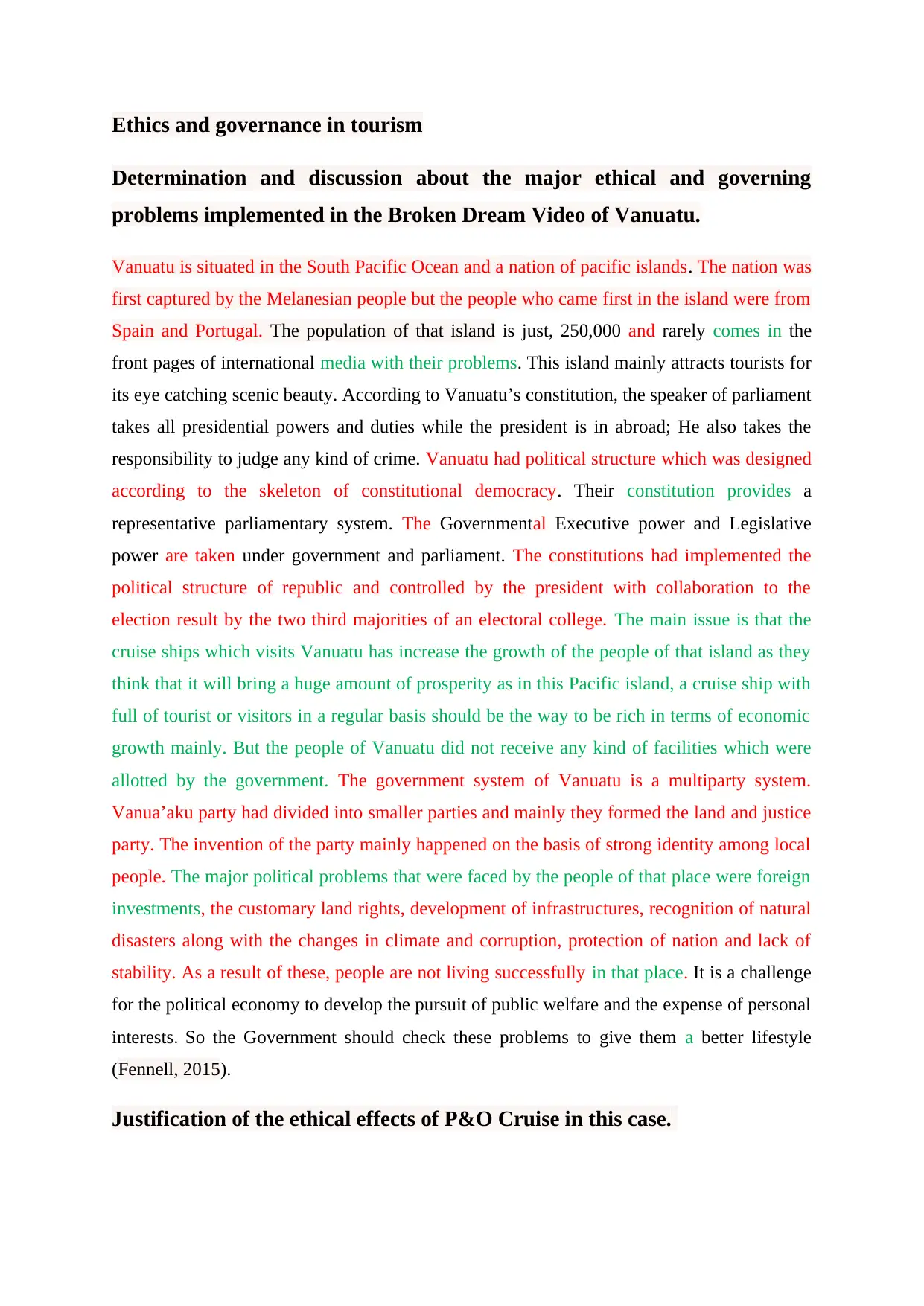
Ethics and governance in tourism
Determination and discussion about the major ethical and governing
problems implemented in the Broken Dream Video of Vanuatu.
Vanuatu is situated in the South Pacific Ocean and a nation of pacific islands. The nation was
first captured by the Melanesian people but the people who came first in the island were from
Spain and Portugal. The population of that island is just, 250,000 and rarely comes in the
front pages of international media with their problems. This island mainly attracts tourists for
its eye catching scenic beauty. According to Vanuatu’s constitution, the speaker of parliament
takes all presidential powers and duties while the president is in abroad; He also takes the
responsibility to judge any kind of crime. Vanuatu had political structure which was designed
according to the skeleton of constitutional democracy. Their constitution provides a
representative parliamentary system. The Governmental Executive power and Legislative
power are taken under government and parliament. The constitutions had implemented the
political structure of republic and controlled by the president with collaboration to the
election result by the two third majorities of an electoral college. The main issue is that the
cruise ships which visits Vanuatu has increase the growth of the people of that island as they
think that it will bring a huge amount of prosperity as in this Pacific island, a cruise ship with
full of tourist or visitors in a regular basis should be the way to be rich in terms of economic
growth mainly. But the people of Vanuatu did not receive any kind of facilities which were
allotted by the government. The government system of Vanuatu is a multiparty system.
Vanua’aku party had divided into smaller parties and mainly they formed the land and justice
party. The invention of the party mainly happened on the basis of strong identity among local
people. The major political problems that were faced by the people of that place were foreign
investments, the customary land rights, development of infrastructures, recognition of natural
disasters along with the changes in climate and corruption, protection of nation and lack of
stability. As a result of these, people are not living successfully in that place. It is a challenge
for the political economy to develop the pursuit of public welfare and the expense of personal
interests. So the Government should check these problems to give them a better lifestyle
(Fennell, 2015).
Justification of the ethical effects of P&O Cruise in this case.
Determination and discussion about the major ethical and governing
problems implemented in the Broken Dream Video of Vanuatu.
Vanuatu is situated in the South Pacific Ocean and a nation of pacific islands. The nation was
first captured by the Melanesian people but the people who came first in the island were from
Spain and Portugal. The population of that island is just, 250,000 and rarely comes in the
front pages of international media with their problems. This island mainly attracts tourists for
its eye catching scenic beauty. According to Vanuatu’s constitution, the speaker of parliament
takes all presidential powers and duties while the president is in abroad; He also takes the
responsibility to judge any kind of crime. Vanuatu had political structure which was designed
according to the skeleton of constitutional democracy. Their constitution provides a
representative parliamentary system. The Governmental Executive power and Legislative
power are taken under government and parliament. The constitutions had implemented the
political structure of republic and controlled by the president with collaboration to the
election result by the two third majorities of an electoral college. The main issue is that the
cruise ships which visits Vanuatu has increase the growth of the people of that island as they
think that it will bring a huge amount of prosperity as in this Pacific island, a cruise ship with
full of tourist or visitors in a regular basis should be the way to be rich in terms of economic
growth mainly. But the people of Vanuatu did not receive any kind of facilities which were
allotted by the government. The government system of Vanuatu is a multiparty system.
Vanua’aku party had divided into smaller parties and mainly they formed the land and justice
party. The invention of the party mainly happened on the basis of strong identity among local
people. The major political problems that were faced by the people of that place were foreign
investments, the customary land rights, development of infrastructures, recognition of natural
disasters along with the changes in climate and corruption, protection of nation and lack of
stability. As a result of these, people are not living successfully in that place. It is a challenge
for the political economy to develop the pursuit of public welfare and the expense of personal
interests. So the Government should check these problems to give them a better lifestyle
(Fennell, 2015).
Justification of the ethical effects of P&O Cruise in this case.
Paraphrase This Document
Need a fresh take? Get an instant paraphrase of this document with our AI Paraphraser
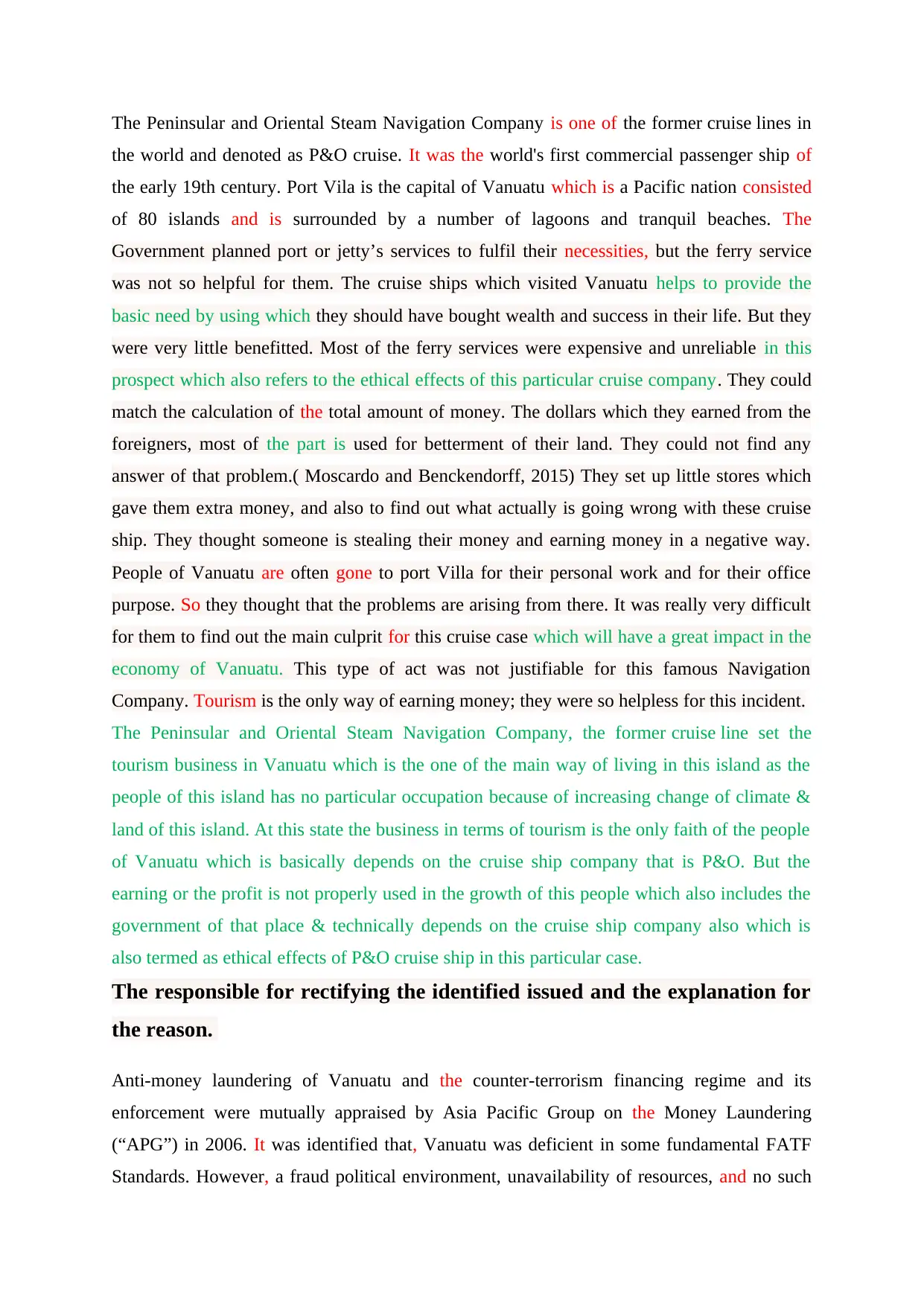
The Peninsular and Oriental Steam Navigation Company is one of the former cruise lines in
the world and denoted as P&O cruise. It was the world's first commercial passenger ship of
the early 19th century. Port Vila is the capital of Vanuatu which is a Pacific nation consisted
of 80 islands and is surrounded by a number of lagoons and tranquil beaches. The
Government planned port or jetty’s services to fulfil their necessities, but the ferry service
was not so helpful for them. The cruise ships which visited Vanuatu helps to provide the
basic need by using which they should have bought wealth and success in their life. But they
were very little benefitted. Most of the ferry services were expensive and unreliable in this
prospect which also refers to the ethical effects of this particular cruise company. They could
match the calculation of the total amount of money. The dollars which they earned from the
foreigners, most of the part is used for betterment of their land. They could not find any
answer of that problem.( Moscardo and Benckendorff, 2015) They set up little stores which
gave them extra money, and also to find out what actually is going wrong with these cruise
ship. They thought someone is stealing their money and earning money in a negative way.
People of Vanuatu are often gone to port Villa for their personal work and for their office
purpose. So they thought that the problems are arising from there. It was really very difficult
for them to find out the main culprit for this cruise case which will have a great impact in the
economy of Vanuatu. This type of act was not justifiable for this famous Navigation
Company. Tourism is the only way of earning money; they were so helpless for this incident.
The Peninsular and Oriental Steam Navigation Company, the former cruise line set the
tourism business in Vanuatu which is the one of the main way of living in this island as the
people of this island has no particular occupation because of increasing change of climate &
land of this island. At this state the business in terms of tourism is the only faith of the people
of Vanuatu which is basically depends on the cruise ship company that is P&O. But the
earning or the profit is not properly used in the growth of this people which also includes the
government of that place & technically depends on the cruise ship company also which is
also termed as ethical effects of P&O cruise ship in this particular case.
The responsible for rectifying the identified issued and the explanation for
the reason.
Anti-money laundering of Vanuatu and the counter-terrorism financing regime and its
enforcement were mutually appraised by Asia Pacific Group on the Money Laundering
(“APG”) in 2006. It was identified that, Vanuatu was deficient in some fundamental FATF
Standards. However, a fraud political environment, unavailability of resources, and no such
the world and denoted as P&O cruise. It was the world's first commercial passenger ship of
the early 19th century. Port Vila is the capital of Vanuatu which is a Pacific nation consisted
of 80 islands and is surrounded by a number of lagoons and tranquil beaches. The
Government planned port or jetty’s services to fulfil their necessities, but the ferry service
was not so helpful for them. The cruise ships which visited Vanuatu helps to provide the
basic need by using which they should have bought wealth and success in their life. But they
were very little benefitted. Most of the ferry services were expensive and unreliable in this
prospect which also refers to the ethical effects of this particular cruise company. They could
match the calculation of the total amount of money. The dollars which they earned from the
foreigners, most of the part is used for betterment of their land. They could not find any
answer of that problem.( Moscardo and Benckendorff, 2015) They set up little stores which
gave them extra money, and also to find out what actually is going wrong with these cruise
ship. They thought someone is stealing their money and earning money in a negative way.
People of Vanuatu are often gone to port Villa for their personal work and for their office
purpose. So they thought that the problems are arising from there. It was really very difficult
for them to find out the main culprit for this cruise case which will have a great impact in the
economy of Vanuatu. This type of act was not justifiable for this famous Navigation
Company. Tourism is the only way of earning money; they were so helpless for this incident.
The Peninsular and Oriental Steam Navigation Company, the former cruise line set the
tourism business in Vanuatu which is the one of the main way of living in this island as the
people of this island has no particular occupation because of increasing change of climate &
land of this island. At this state the business in terms of tourism is the only faith of the people
of Vanuatu which is basically depends on the cruise ship company that is P&O. But the
earning or the profit is not properly used in the growth of this people which also includes the
government of that place & technically depends on the cruise ship company also which is
also termed as ethical effects of P&O cruise ship in this particular case.
The responsible for rectifying the identified issued and the explanation for
the reason.
Anti-money laundering of Vanuatu and the counter-terrorism financing regime and its
enforcement were mutually appraised by Asia Pacific Group on the Money Laundering
(“APG”) in 2006. It was identified that, Vanuatu was deficient in some fundamental FATF
Standards. However, a fraud political environment, unavailability of resources, and no such
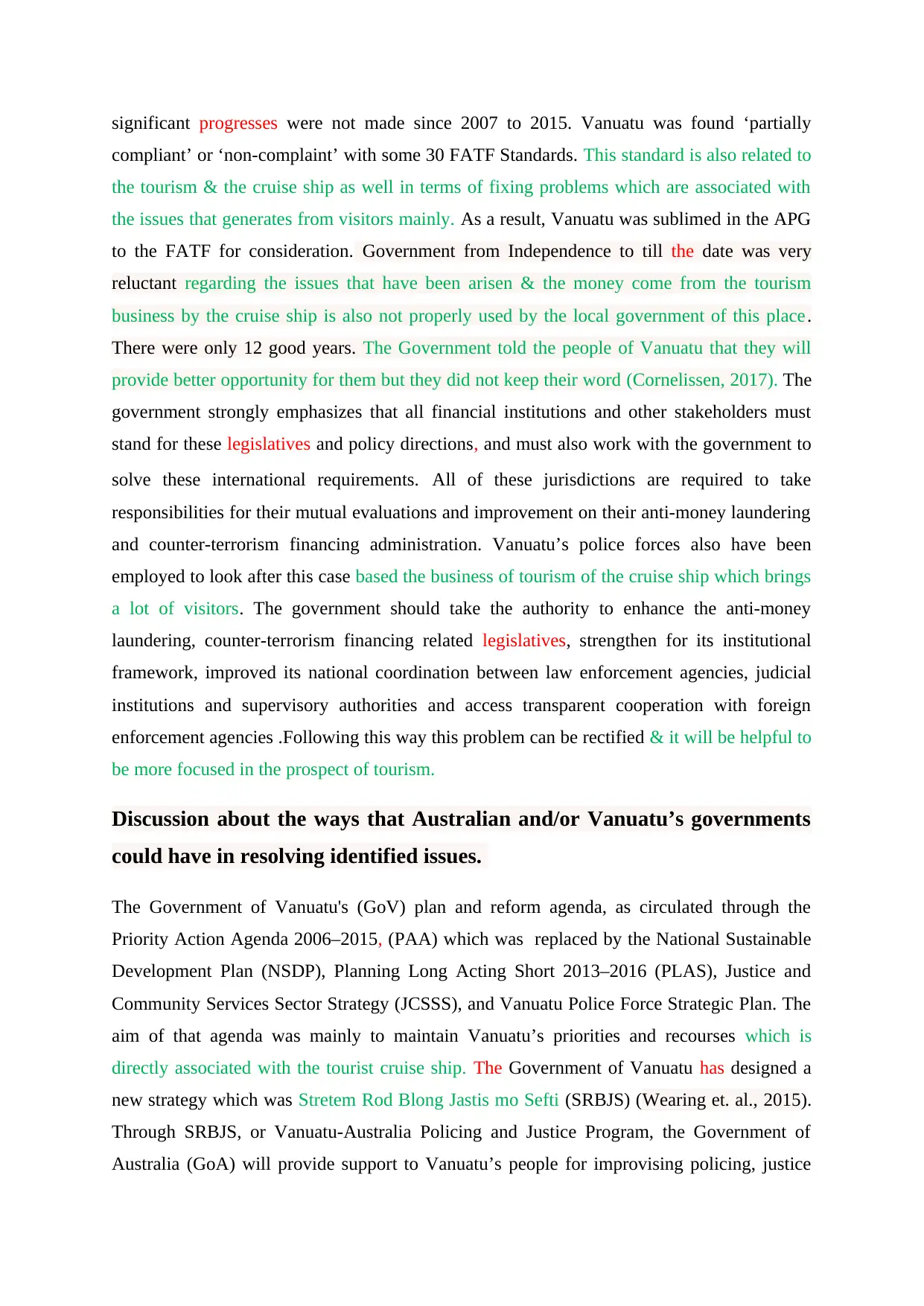
significant progresses were not made since 2007 to 2015. Vanuatu was found ‘partially
compliant’ or ‘non-complaint’ with some 30 FATF Standards. This standard is also related to
the tourism & the cruise ship as well in terms of fixing problems which are associated with
the issues that generates from visitors mainly. As a result, Vanuatu was sublimed in the APG
to the FATF for consideration. Government from Independence to till the date was very
reluctant regarding the issues that have been arisen & the money come from the tourism
business by the cruise ship is also not properly used by the local government of this place.
There were only 12 good years. The Government told the people of Vanuatu that they will
provide better opportunity for them but they did not keep their word (Cornelissen, 2017). The
government strongly emphasizes that all financial institutions and other stakeholders must
stand for these legislatives and policy directions, and must also work with the government to
solve these international requirements. All of these jurisdictions are required to take
responsibilities for their mutual evaluations and improvement on their anti-money laundering
and counter-terrorism financing administration. Vanuatu’s police forces also have been
employed to look after this case based the business of tourism of the cruise ship which brings
a lot of visitors. The government should take the authority to enhance the anti-money
laundering, counter-terrorism financing related legislatives, strengthen for its institutional
framework, improved its national coordination between law enforcement agencies, judicial
institutions and supervisory authorities and access transparent cooperation with foreign
enforcement agencies .Following this way this problem can be rectified & it will be helpful to
be more focused in the prospect of tourism.
Discussion about the ways that Australian and/or Vanuatu’s governments
could have in resolving identified issues.
The Government of Vanuatu's (GoV) plan and reform agenda, as circulated through the
Priority Action Agenda 2006–2015, (PAA) which was replaced by the National Sustainable
Development Plan (NSDP), Planning Long Acting Short 2013–2016 (PLAS), Justice and
Community Services Sector Strategy (JCSSS), and Vanuatu Police Force Strategic Plan. The
aim of that agenda was mainly to maintain Vanuatu’s priorities and recourses which is
directly associated with the tourist cruise ship. The Government of Vanuatu has designed a
new strategy which was Stretem Rod Blong Jastis mo Sefti (SRBJS) (Wearing et. al., 2015).
Through SRBJS, or Vanuatu-Australia Policing and Justice Program, the Government of
Australia (GoA) will provide support to Vanuatu’s people for improvising policing, justice
compliant’ or ‘non-complaint’ with some 30 FATF Standards. This standard is also related to
the tourism & the cruise ship as well in terms of fixing problems which are associated with
the issues that generates from visitors mainly. As a result, Vanuatu was sublimed in the APG
to the FATF for consideration. Government from Independence to till the date was very
reluctant regarding the issues that have been arisen & the money come from the tourism
business by the cruise ship is also not properly used by the local government of this place.
There were only 12 good years. The Government told the people of Vanuatu that they will
provide better opportunity for them but they did not keep their word (Cornelissen, 2017). The
government strongly emphasizes that all financial institutions and other stakeholders must
stand for these legislatives and policy directions, and must also work with the government to
solve these international requirements. All of these jurisdictions are required to take
responsibilities for their mutual evaluations and improvement on their anti-money laundering
and counter-terrorism financing administration. Vanuatu’s police forces also have been
employed to look after this case based the business of tourism of the cruise ship which brings
a lot of visitors. The government should take the authority to enhance the anti-money
laundering, counter-terrorism financing related legislatives, strengthen for its institutional
framework, improved its national coordination between law enforcement agencies, judicial
institutions and supervisory authorities and access transparent cooperation with foreign
enforcement agencies .Following this way this problem can be rectified & it will be helpful to
be more focused in the prospect of tourism.
Discussion about the ways that Australian and/or Vanuatu’s governments
could have in resolving identified issues.
The Government of Vanuatu's (GoV) plan and reform agenda, as circulated through the
Priority Action Agenda 2006–2015, (PAA) which was replaced by the National Sustainable
Development Plan (NSDP), Planning Long Acting Short 2013–2016 (PLAS), Justice and
Community Services Sector Strategy (JCSSS), and Vanuatu Police Force Strategic Plan. The
aim of that agenda was mainly to maintain Vanuatu’s priorities and recourses which is
directly associated with the tourist cruise ship. The Government of Vanuatu has designed a
new strategy which was Stretem Rod Blong Jastis mo Sefti (SRBJS) (Wearing et. al., 2015).
Through SRBJS, or Vanuatu-Australia Policing and Justice Program, the Government of
Australia (GoA) will provide support to Vanuatu’s people for improvising policing, justice
⊘ This is a preview!⊘
Do you want full access?
Subscribe today to unlock all pages.

Trusted by 1+ million students worldwide
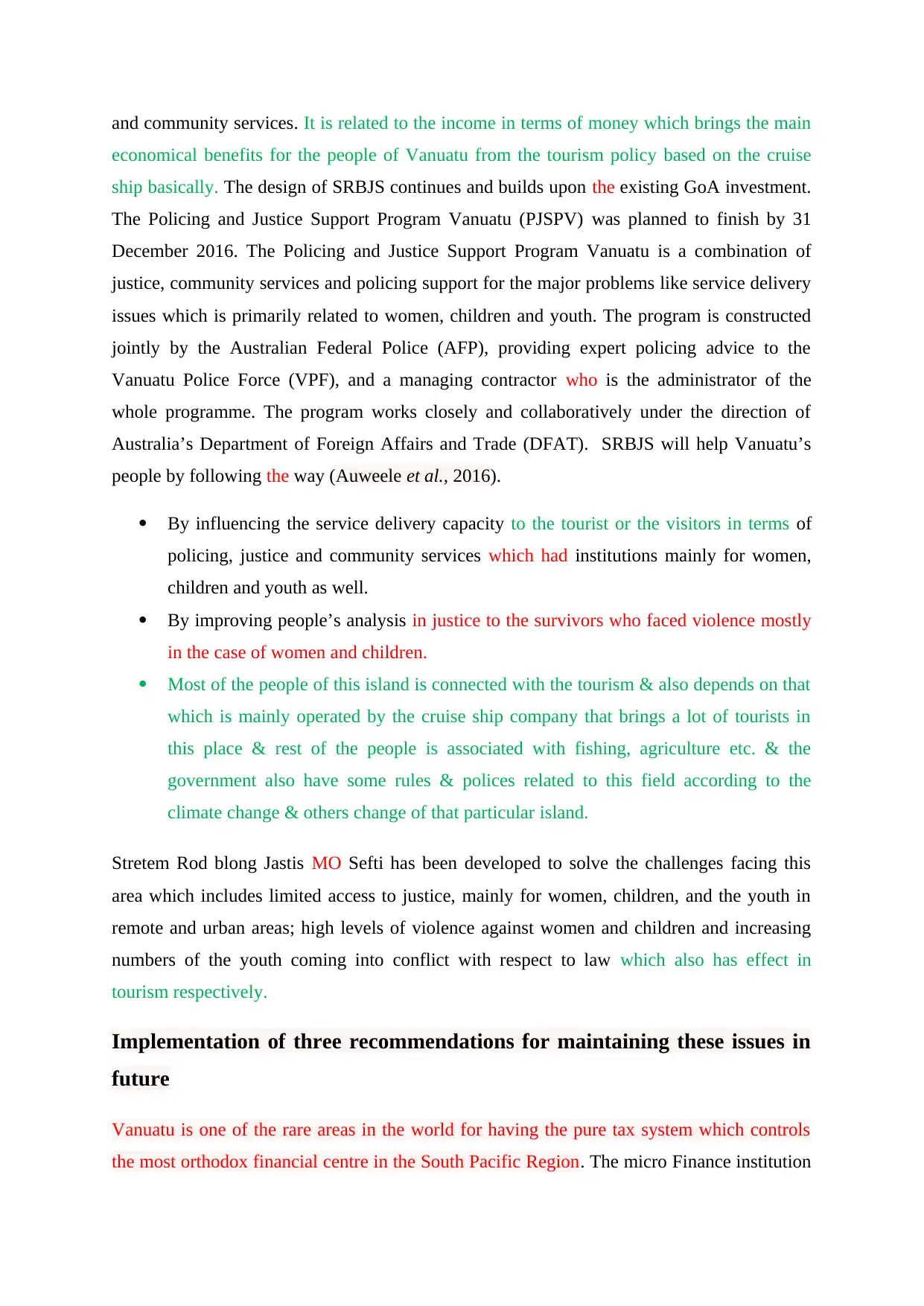
and community services. It is related to the income in terms of money which brings the main
economical benefits for the people of Vanuatu from the tourism policy based on the cruise
ship basically. The design of SRBJS continues and builds upon the existing GoA investment.
The Policing and Justice Support Program Vanuatu (PJSPV) was planned to finish by 31
December 2016. The Policing and Justice Support Program Vanuatu is a combination of
justice, community services and policing support for the major problems like service delivery
issues which is primarily related to women, children and youth. The program is constructed
jointly by the Australian Federal Police (AFP), providing expert policing advice to the
Vanuatu Police Force (VPF), and a managing contractor who is the administrator of the
whole programme. The program works closely and collaboratively under the direction of
Australia’s Department of Foreign Affairs and Trade (DFAT). SRBJS will help Vanuatu’s
people by following the way (Auweele et al., 2016).
By influencing the service delivery capacity to the tourist or the visitors in terms of
policing, justice and community services which had institutions mainly for women,
children and youth as well.
By improving people’s analysis in justice to the survivors who faced violence mostly
in the case of women and children.
Most of the people of this island is connected with the tourism & also depends on that
which is mainly operated by the cruise ship company that brings a lot of tourists in
this place & rest of the people is associated with fishing, agriculture etc. & the
government also have some rules & polices related to this field according to the
climate change & others change of that particular island.
Stretem Rod blong Jastis MO Sefti has been developed to solve the challenges facing this
area which includes limited access to justice, mainly for women, children, and the youth in
remote and urban areas; high levels of violence against women and children and increasing
numbers of the youth coming into conflict with respect to law which also has effect in
tourism respectively.
Implementation of three recommendations for maintaining these issues in
future
Vanuatu is one of the rare areas in the world for having the pure tax system which controls
the most orthodox financial centre in the South Pacific Region. The micro Finance institution
economical benefits for the people of Vanuatu from the tourism policy based on the cruise
ship basically. The design of SRBJS continues and builds upon the existing GoA investment.
The Policing and Justice Support Program Vanuatu (PJSPV) was planned to finish by 31
December 2016. The Policing and Justice Support Program Vanuatu is a combination of
justice, community services and policing support for the major problems like service delivery
issues which is primarily related to women, children and youth. The program is constructed
jointly by the Australian Federal Police (AFP), providing expert policing advice to the
Vanuatu Police Force (VPF), and a managing contractor who is the administrator of the
whole programme. The program works closely and collaboratively under the direction of
Australia’s Department of Foreign Affairs and Trade (DFAT). SRBJS will help Vanuatu’s
people by following the way (Auweele et al., 2016).
By influencing the service delivery capacity to the tourist or the visitors in terms of
policing, justice and community services which had institutions mainly for women,
children and youth as well.
By improving people’s analysis in justice to the survivors who faced violence mostly
in the case of women and children.
Most of the people of this island is connected with the tourism & also depends on that
which is mainly operated by the cruise ship company that brings a lot of tourists in
this place & rest of the people is associated with fishing, agriculture etc. & the
government also have some rules & polices related to this field according to the
climate change & others change of that particular island.
Stretem Rod blong Jastis MO Sefti has been developed to solve the challenges facing this
area which includes limited access to justice, mainly for women, children, and the youth in
remote and urban areas; high levels of violence against women and children and increasing
numbers of the youth coming into conflict with respect to law which also has effect in
tourism respectively.
Implementation of three recommendations for maintaining these issues in
future
Vanuatu is one of the rare areas in the world for having the pure tax system which controls
the most orthodox financial centre in the South Pacific Region. The micro Finance institution
Paraphrase This Document
Need a fresh take? Get an instant paraphrase of this document with our AI Paraphraser
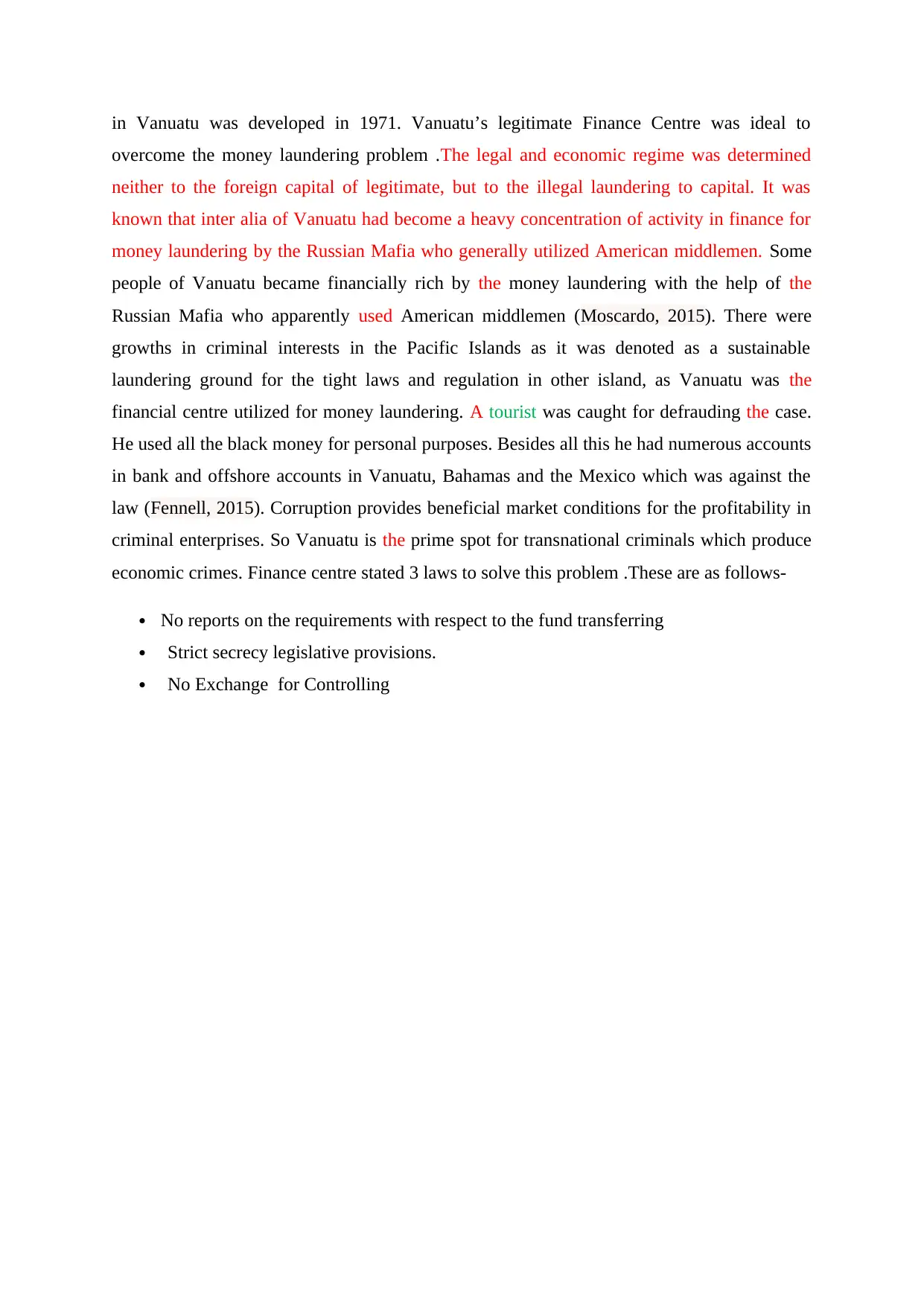
in Vanuatu was developed in 1971. Vanuatu’s legitimate Finance Centre was ideal to
overcome the money laundering problem .The legal and economic regime was determined
neither to the foreign capital of legitimate, but to the illegal laundering to capital. It was
known that inter alia of Vanuatu had become a heavy concentration of activity in finance for
money laundering by the Russian Mafia who generally utilized American middlemen. Some
people of Vanuatu became financially rich by the money laundering with the help of the
Russian Mafia who apparently used American middlemen (Moscardo, 2015). There were
growths in criminal interests in the Pacific Islands as it was denoted as a sustainable
laundering ground for the tight laws and regulation in other island, as Vanuatu was the
financial centre utilized for money laundering. A tourist was caught for defrauding the case.
He used all the black money for personal purposes. Besides all this he had numerous accounts
in bank and offshore accounts in Vanuatu, Bahamas and the Mexico which was against the
law (Fennell, 2015). Corruption provides beneficial market conditions for the profitability in
criminal enterprises. So Vanuatu is the prime spot for transnational criminals which produce
economic crimes. Finance centre stated 3 laws to solve this problem .These are as follows-
No reports on the requirements with respect to the fund transferring
Strict secrecy legislative provisions.
No Exchange for Controlling
overcome the money laundering problem .The legal and economic regime was determined
neither to the foreign capital of legitimate, but to the illegal laundering to capital. It was
known that inter alia of Vanuatu had become a heavy concentration of activity in finance for
money laundering by the Russian Mafia who generally utilized American middlemen. Some
people of Vanuatu became financially rich by the money laundering with the help of the
Russian Mafia who apparently used American middlemen (Moscardo, 2015). There were
growths in criminal interests in the Pacific Islands as it was denoted as a sustainable
laundering ground for the tight laws and regulation in other island, as Vanuatu was the
financial centre utilized for money laundering. A tourist was caught for defrauding the case.
He used all the black money for personal purposes. Besides all this he had numerous accounts
in bank and offshore accounts in Vanuatu, Bahamas and the Mexico which was against the
law (Fennell, 2015). Corruption provides beneficial market conditions for the profitability in
criminal enterprises. So Vanuatu is the prime spot for transnational criminals which produce
economic crimes. Finance centre stated 3 laws to solve this problem .These are as follows-
No reports on the requirements with respect to the fund transferring
Strict secrecy legislative provisions.
No Exchange for Controlling
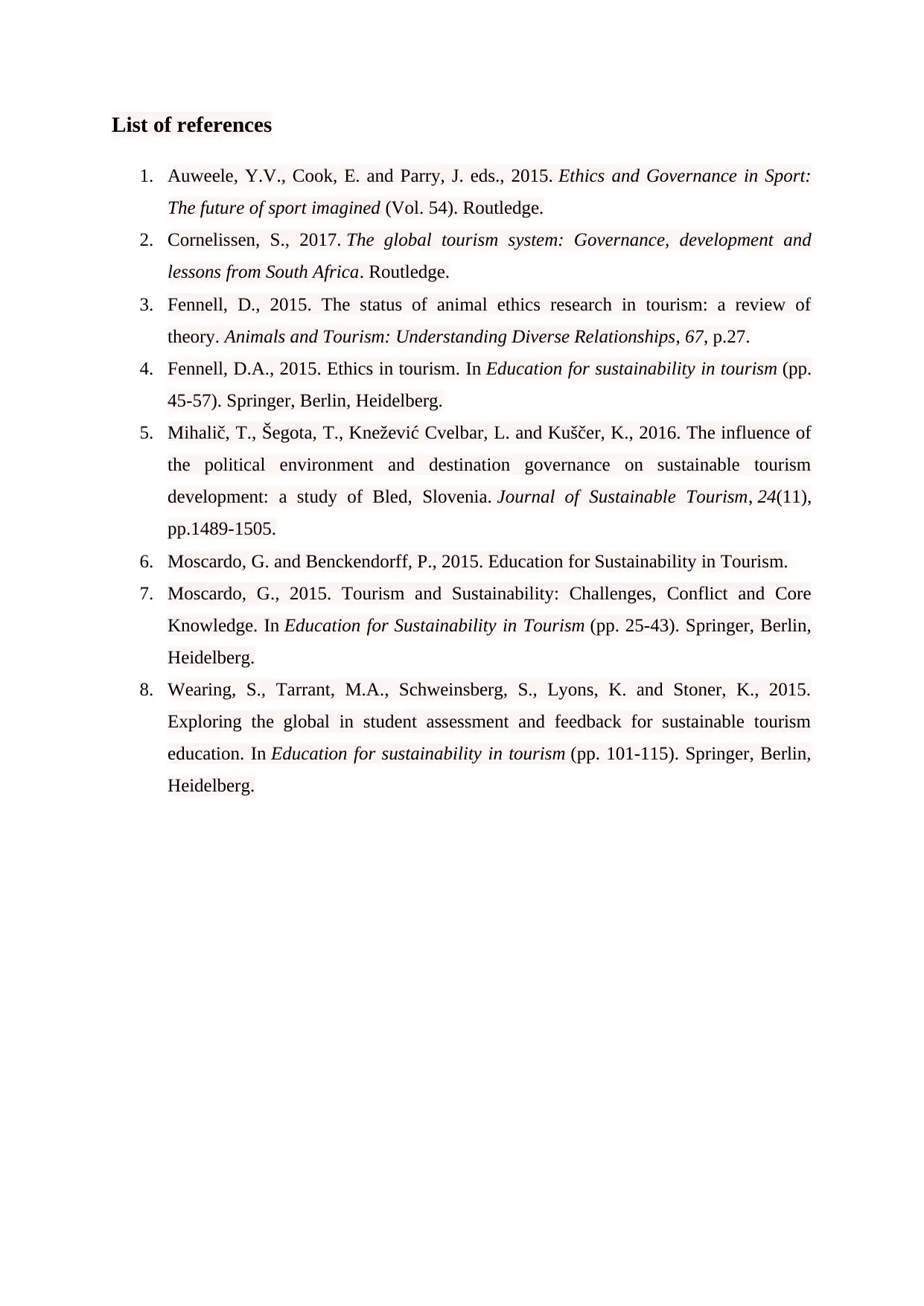
List of references
1. Auweele, Y.V., Cook, E. and Parry, J. eds., 2015. Ethics and Governance in Sport:
The future of sport imagined (Vol. 54). Routledge.
2. Cornelissen, S., 2017. The global tourism system: Governance, development and
lessons from South Africa. Routledge.
3. Fennell, D., 2015. The status of animal ethics research in tourism: a review of
theory. Animals and Tourism: Understanding Diverse Relationships, 67, p.27.
4. Fennell, D.A., 2015. Ethics in tourism. In Education for sustainability in tourism (pp.
45-57). Springer, Berlin, Heidelberg.
5. Mihalič, T., Šegota, T., Knežević Cvelbar, L. and Kuščer, K., 2016. The influence of
the political environment and destination governance on sustainable tourism
development: a study of Bled, Slovenia. Journal of Sustainable Tourism, 24(11),
pp.1489-1505.
6. Moscardo, G. and Benckendorff, P., 2015. Education for Sustainability in Tourism.
7. Moscardo, G., 2015. Tourism and Sustainability: Challenges, Conflict and Core
Knowledge. In Education for Sustainability in Tourism (pp. 25-43). Springer, Berlin,
Heidelberg.
8. Wearing, S., Tarrant, M.A., Schweinsberg, S., Lyons, K. and Stoner, K., 2015.
Exploring the global in student assessment and feedback for sustainable tourism
education. In Education for sustainability in tourism (pp. 101-115). Springer, Berlin,
Heidelberg.
1. Auweele, Y.V., Cook, E. and Parry, J. eds., 2015. Ethics and Governance in Sport:
The future of sport imagined (Vol. 54). Routledge.
2. Cornelissen, S., 2017. The global tourism system: Governance, development and
lessons from South Africa. Routledge.
3. Fennell, D., 2015. The status of animal ethics research in tourism: a review of
theory. Animals and Tourism: Understanding Diverse Relationships, 67, p.27.
4. Fennell, D.A., 2015. Ethics in tourism. In Education for sustainability in tourism (pp.
45-57). Springer, Berlin, Heidelberg.
5. Mihalič, T., Šegota, T., Knežević Cvelbar, L. and Kuščer, K., 2016. The influence of
the political environment and destination governance on sustainable tourism
development: a study of Bled, Slovenia. Journal of Sustainable Tourism, 24(11),
pp.1489-1505.
6. Moscardo, G. and Benckendorff, P., 2015. Education for Sustainability in Tourism.
7. Moscardo, G., 2015. Tourism and Sustainability: Challenges, Conflict and Core
Knowledge. In Education for Sustainability in Tourism (pp. 25-43). Springer, Berlin,
Heidelberg.
8. Wearing, S., Tarrant, M.A., Schweinsberg, S., Lyons, K. and Stoner, K., 2015.
Exploring the global in student assessment and feedback for sustainable tourism
education. In Education for sustainability in tourism (pp. 101-115). Springer, Berlin,
Heidelberg.
⊘ This is a preview!⊘
Do you want full access?
Subscribe today to unlock all pages.

Trusted by 1+ million students worldwide
1 out of 6
Related Documents
Your All-in-One AI-Powered Toolkit for Academic Success.
+13062052269
info@desklib.com
Available 24*7 on WhatsApp / Email
![[object Object]](/_next/static/media/star-bottom.7253800d.svg)
Unlock your academic potential
Copyright © 2020–2026 A2Z Services. All Rights Reserved. Developed and managed by ZUCOL.





